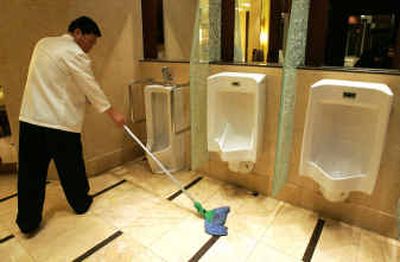Summit on toilets begins

BEIJING – Laugh all you want, say public hygiene experts at the World Toilet Summit, but the importance of “loos” you can use is no joke.
The three-day event, which began Wednesday in Beijing, is an international commode conference. Some 150 scholars, toilet designers and environmentalists from 19 countries gathered to exchange ideas on topics such as the latest toilet technologies, lavatory management tips and the relationship between toilets and tourism development.
“People are saying ‘We want good toilets!’ because toilets are a basic human right and that basic human right has been neglected,” said Jack Sim, founder of the World Toilet Organization, a summit co-sponsor.
China, known for fetid public toilets that often are little more than open trenches, is eager to show off its advances while preparing for the 2008 Beijing Olympics. Delegates to the conference are to be taken on a tour of new and renovated public toilets .
With a packed conference schedule of slide shows, lectures and question-and-answer sessions, there was very little room for humor.
“You can laugh at it for a short time,” said Sim, whose group is based in the hyper-clean island nation of Singapore. “But after a few seconds, you should start to pay serious attention to the subject” that affects your quality of life.
The convention is in its fourth year, with Singapore, Seoul and Taipei as previous hosts. Participants this year came from countries as far away as Finland, Japan and the United States.
Photos of showcase lavatories were also displayed at the conference, from a ladybug-shaped one in a public garden to another modeled after a grass hut in a wildlife park. Facilities with baby-changing stations, wheelchair ramps and gleaming white ceramic urinals were also featured.
“New public toilets are an important symbol to demonstrate the development of the city,” said Liang Guangsheng, deputy director of Beijing’s Municipal Administrative Committee.
In the past three years, Beijing has spent $29 million on building or renovating 747 restrooms at tourist spots, according to the government.
“The toilets are sanitary, convenient and private,” Yu Changjiang, director general of the city’s tourism bureau said. The city also aims to make them suitable for users of all ages, for the disabled, and energy- and water-efficient.
“People settle for good food, good clothes and good living conditions without paying enough attention to the toilet,” Yu said. “Toilet issues are a very important symbol of people’s quality of life.”
The city has come up with a rating system of one to four stars for its public washrooms, reportedly based on such criteria as granite floors, remote-sensor flushes, automatic hand-driers and piped-in music.
The capital now has 88 four-star lavatories, 161 that qualify for three stars, 312 for two and 110 for one. Countless others, are perhaps best not mentioned.
Maintenance is as important as construction, said Simon Tay, one of the speakers at the summit.
“It’s something that China needs to think about,” said Tay, chairman of Singapore’s National Environment Agency. “I hate the word luxury toilet because really good toilets should be an everyday common thing. It doesn’t have to look like the Shangri-La toilet … in order for it to be something that we can be proud of.”